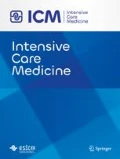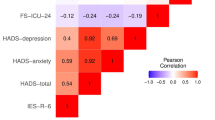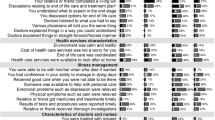Abstract
Objectives
To determine satisfaction in regard to information concerning, and support and facilities for relatives in the intensive care unit (ICU), and to compare this with the staff’s expectations on these issues; to determine relatives’ degree of psychological distress and use of hypnotics, anxiolytics, and antidepressants; finally, to compare the distress of relatives of survivors and relatives of non-survivors.
Design
Prospective study.
Setting
University-affiliated ICU.
Methods
Relatives of 50 patients who survived at least 6 days in the ICU and relatives of 18 non-survivors who stayed for at least 24 h anonymously completed a mailed questionnaire at home 4 weeks after treatment in the ICU. Forty-three staff members (69%) answered the questionnaire. The degree of satisfaction was measured on a five-point scale (0–4).
Main results
The average satisfaction scores were 3.4±0.6 SD for relatives of survivors and 3.4±0.5 for relatives of non-survivors. Staff expected a significantly lower degree of satisfaction, with a score of 2.9±0.5 (P<0.001). The distress scores of relatives of survivors (2.7±1.0) were no higher than the ones of relatives of non-survivors (2.4±0.6) during the ICU stay, but significantly lower than staff expectations (3.2±0.5) (P<0.01). The use of medication was moderate.
Conclusions
The relatives’ satisfaction was greater than anticipated by the staff. Staff generally expected a higher degree of distress among relatives than was actually the case. Relatives were very satisfied with the support and communication in the ICU despite substantial distress. Relatives of survivors and non-survivors were equally satisfied.




Similar content being viewed by others
References
Biittebier P, Vanoost S, Delva D, Ferdinande P, Frans E (2001) Needs of relatives of critical care patients: perceptions of relatives, physicians and nurses. Intensive Care Med 27:160–165
Jacono J, Hicks G, Antonioni C, O’Brian K, Rasi M (1990) Comparison of perceived needs of family members registered nurses and family members of critically ill patients in intensive care and neonatal intensive care units. Heart Lung 19:72–78
Heyland DK, Rocker GM, Dodek PM, Kutsogiannis DJ, Konopad E, Cook DJ, Peters S, Tranner JE, O’Callaghan CJ (2002) Family satisfaction with care in the intensive care unit: result of a multiple center study. Crit Care Med 30:1413–1418
Lynn-McHale DJ, Bellinger A (1988) Need satisfaction levels of family members of critical care patients and accuracy of nurses’ perceptions. Heart Lung 17:447–453
Forrester DA, Murphy PA, Price DM, Monaghan JF (1990) Critical care family needs: nurse-family member confederate pairs. Heart Lung 10:655–661
Molter NC (1979) Needs of relatives of critically ill patients: a descriptive study. Heart Lung 8:332–339
Daley L (1984) The perceived immediate needs of families with relatives in the intensive care setting. Heart Lung 13:231–237
Foss KR, Tenholder MF (1993) Expectations and needs of persons with family members in an intensive care unit as opposed to a general ward. South Med J 86:380–384
Warren NA (1993) Perceived needs of family members in the critical care waiting room. Crit Care Q 16:56–63
Kosco M, Warren NA (2000) Critical care nurses’ perceptions of family needs as met. Crit Care Nurs Q 23:60–72
Rodgers CD (1983) Needs of relatives of cardiac surgery patients during the critical care phase. Focus Crit Care 10:50–55
Norris L, Grove S (1986) Investigation of selected psychosocial needs of family members of critically ill adult patients. Heart Lung 15:194–199
Dockter B, Black DR, Howell MF, Engelberg D, Amick T, Neimier D, Sheets N (1988) Families and intensive care nurses: comparison of perceptions. Patient Educ Couns 12:29–36
Azoulay E, Pochard F, Chevret S, Lemaire F, Mokhtari M, Le Gall JR, Dhainaut JF, Schlemmer B (2001) Meeting the needs of intensive care unit patient families. Am J Respir Crit Care Med 163:135–139
Heyland DK, Tranmer J (2001) Measuring family satisfaction with care in the intensive care unit: the development of a new questionnaire and preliminary results. The KGH ICU Research Working Group. J Crit Care 16:142–149
Henneman EA, McKenzie JB, Dewa CS (1992) An evaluation of interventions for meeting the information needs of families of critically ill patients. Am J Crit Care 1:85–93
Zazpe C, Margall MA, Otano C, Perochena MP, Asiain MC (1997) Meeting the needs of family members of critically ill patients in a Spanish intensive care unit. Intensive Crit Care Nurs 13:12–16
Barbret LC, Westphal CG, Daly GA (1997) Meeting information needs of families of critical care patients. J Health Qual 19:5–9
Azoulay E, Pochard F, Chevret S, Jourdain M, Bornstain C, Wernet A, Cattaneo I, Annane D, Brun F, Bollaert PE, Zahar JR, Goldgran-Toledano D, Adrie C, Joly LM, Tayoro J, Desmettre T, Pigne E, Parrot A, Sanchez O, Poisson C, Le Gall JR, Schlemmer B, Lemaire F (2002) Impact of family information leaflet on effectiveness of information provided to family members of intensive care unit patients: a multicenter, prospective, randomized controlled trial. Am J Respir Crit Care Med 165:438–442
McGaughey J, Harrison S (1994) Developing information booklet to meet the needs of intensive care patients and relatives. Intensive Crit Care Nurs 10:271–277
Lilly CM, De Meo DL, Sonna LA, Haley KJ, Massaro AF, Wallace RF, Cody S (2000) An intensive communication intervention for the critically ill. Am J Medicine 119:469–475
Stokland O, Bringager N, Serck Hansen E, Eriksen H, Langen I, Ekeberg O (2002) Strains, communication and satisfaction of relatives in the ICU compared with the expectations by the medical staff. Intensive Care Med 28 [Suppl 1]:S159
Johnson D, Wilson M, Cavanaugh B, Bryden C, Gudmundson D, Moodley O (1998) Measuring the ability to meet family needs in an intensive care unit. Crit Care Med 26:266–271
Miranda DR, Moreno R, Iapichino G (1997) Nine equivalents of nursing manpower use score (NEMS). Intensive Care Med 23:760–765
Le Gall JR, Lemeshow S, Saulnier F (1993) A new simplified acute physiology score (SAPS II) based on a European/North American mulitcenter study. JAMA 270:2957–2963
Azoulay E, Chevret S, Leleu G, Pochard F, Barboteu M, Adrie C, Canoui P, Le Gall JR, Schlemmer B (2000) Half the families of intensive care unit patients experience inadequate communication with physicians. Crit Care Med 28:3044–3049
Malacrida R, Bettelini CM, Degrate A, Martinez M, Badia F, Piazza J, Vizzardi N, Wullschleger R, Rapin CH (1998) Reasons for dissatisfaction: a survey of relatives of intensive care patients who died. Crit Care Med 26:1187–1193
Pochard F, Azoulay E, Chevret S, Lemaire F, Huber P, Canoui P, Grassin M, Zittoun R, Le Gall JR, Dhainaut JF, Schlemmer B (2001) Symptoms of anxiety and depression in family members of intensive care unit patients: ethical hypothesis regarding decision-making capacity. Crit Care Med 29:1893–1897
Novaes MA, Knobel E, Bork AM, Pavao OF, Nogueira-Martins LA, Ferraz MB (1999) Stressors in ICU: perception of the patient, relatives and health care team. Intensiv Care Med 25:1421–1426
Granger CE, George C, Shelly MP (1995) The management of bereavement on intensive care units. Intensive Care Med 21:429–436
Danis M, Jarr SL, Southerland LI, Nocella RS, Patrick DL (1987) Comparison of patient, family, and nurse evaluation of the usefulness of intensive care. Crit Care Med 15:138–143
Jamerson PA, Scheibmeir M, Bott MJ, Crighton F, Hinton RH, Kuckelman A (1996) The experiences of families with a relative in the intensive care unit. Heart Lung 25:467–474
Halm MA, Titler MG (1990) Appropriateness of critical care visitation: perceptions of patients, families, nurses and physicians. J Nurs Qual Assur 5:25–37
Stockdale LL, Hughes JP (1988) Critical care unit visiting policies: a survey. Focus Crit Care 15:45–48
Leske JS (1991) Internal psychometric properties of the Critical Care Family Needs Inventory. Heart Lung 20:236–244
Acknowledgement
The authors would like to thank the relatives and the nurses participating in this study, and a special thanks to the nurses Hanne Eriksen and Eric Serck Hansen for assistance in the gathering of data.
Author information
Authors and Affiliations
Corresponding author
Electronic Supplementary Material
Rights and permissions
About this article
Cite this article
Myhren, H., Ekeberg, Ø., Langen, I. et al. Emotional strain, communication, and satisfaction of family members in the intensive care unit compared with expectations of the medical staff: experiences from a Norwegian University Hospital. Intensive Care Med 30, 1791–1798 (2004). https://doi.org/10.1007/s00134-004-2375-5
Received:
Accepted:
Published:
Issue Date:
DOI: https://doi.org/10.1007/s00134-004-2375-5




